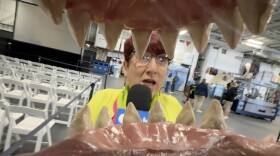San Diego voters overwhelmingly approved Measure B in November of 2020. It dissolved the police review board and mandated the creation of a Commission on Police Practices (CPP).
Unlike the review board, the Commission has teeth — including subpoena power.
The composition of the commission has been the sticking point. The city has been negotiating with the San Diego Police Officers Association (SDPOA) for months but in August, they declared an impasse.
On Monday, the issue came before the city council.
“I want to thank the city for standing strong," said Andrea St. Julian in testimony before the council. St. Julian is the co-chair of San Diegans for Justice. She was the principal author of the text that became Measure B.
“There is nothing about me or my background that makes me anti-police. In fact, Measure B was about helping everyone be safe, including police officers," St. Julian said in response to criticism from the SDPOA that the makeup of the commission will be biased against law enforcement.
That is not how the union sees things.
“Officers hold zero trust in the CPP as it currently stands," said SDPOA president Jared Wilson, in testimony before the city council Monday.
Wilson went on to say, “While great steps have been taken to ensure there is no pro-law enforcement bias, there have been significant efforts to ensure there is an anti-law enforcement bias.”
The SDPOA opposes the exclusion of family members or any co-habitants of San Diego police officers from the commission. And they oppose allowing commission seats for those convicted of felonies — including attacks on law enforcement — as long as they’ve done their time.
The SDPOA offered a compromise; they’d drop their opposition to convicted felons serving as long as family members could serve, but the city rejected that.
No one spoke in opposition to the CPP except for the SDPOA.
City council member Monica Montgomery-Steppe said she expects the commission to be fair.
“I think it is a good balance. I really do," she said. "I think that the commissioners will be upright, the commissioners will be thoughtful.”
On Tuesday, the SDPOA released a statement saying, "The SDPOA supports the goal of community oversight in a collaborative effort to make the City of San Diego a better place. However, we must work together in selecting a legitimate and unbiased committee. ...
"We are disturbed by the unwillingness of the City to come to a mutual understanding with our association and our officers at large on this issue. This is yet another example of our officers feeling unsupported and unappreciated, which is apparent by the 55 officers who have left the department since July 1. The lack of support from the City is a slippery slope that is drastically affecting our officers and will directly impact public safety."
The city council will meet one more time to approve permanent operating procedures. Then the San Diego Commission on Police Practices will finally begin its work — two years after the voters approved it.
-
On Monday the San Diego City Council passed an ordinance further defining who is eligible to serve on the city’s Commission on Police Practices.








